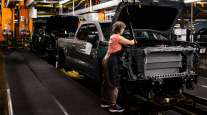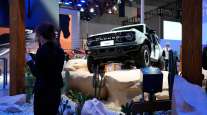Ford CEO Farley Stokes Stock With His $30 Billion Bid in EV Race

[Ensure you have all the info you need in these unprecedented times. Subscribe now.]
Ford Motor Co. CEO Jim Farley made a bold bid for electric supremacy May 26 by boosting his company’s bet on plug-in models by more than a third, to $30 billion, and promising to electrify virtually the entire lineup.
Investors, who have long viewed Ford as an EV laggard, liked what they heard during the automaker’s Capital Markets Day and bid up shares to a five-year high. Since Farley took over took over on Oct. 1, Ford shares have more than doubled.
The stock rose 8.5% May 26 to $13.90 — the highest since July 21, 2016, and the biggest one-day jump in almost a year.
“It shows CEO Jim Farley’s imprint on the strategy to transition Ford,” Dan Levy, an analyst with Credit Suisse, wrote in a note to investors May 26. “The company is taking the right steps.”
RELATED: Ford Pressured to Provide Path to All-Electric Future
Farley pledged that four of every 10 vehicles Ford sells would be battery-powered by 2030, which is saying something for a company that currently sells only one electric model, the Mustang Mach-E. That would seem to fall short of the ambitious goal of General Motors Co. CEO Mary Barra to go all-electric by 2035. But that’s not how Farley sees it.
“Their time frame may be further out, they may be talking only about light-duty vehicles — we’re talking about our entire fleet, no asterisks,” Farley said when asked about Barra’s goal. “We think it’s prudent right now to really focus not on an aspiration, but to share with everyone our actual plans.”
Electric Lineup
Those plans include an electric version of the Explorer, its best selling sport-utility vehicle, the Lincoln Aviator and a host of other vehicles it didn’t identify by name. The list included the description “rugged SUV,” which suggests the revived Bronco may have a battery in its future.
“Our ambition is to lead the electric revolution,” Farley told analysts and investors in his presentation.
RELATED: Ford's High-Stakes Electric F-150 Will Start Under $40,000
To do that, Ford is taking control of building and developing the power sources propelling those EVs. The automaker is creating a range of batteries it calls IonBoost, while developing solid-state batteries seen as the next breakthrough to lower prices and extend driving range on a single charge.
“This is our biggest opportunity for growth and value creation since Henry Ford started to scale the Model T, and we’re grabbing it with both hands,” Farley said. He leavened his bold promises by acknowledging Ford had fallen short in the past.
“In recent years, our financial performance hasn’t been at an acceptable level,” Farley said. “In the last few quarters, we’ve made a lot of progress. We’re running a much tighter ship.”
New Business
The automaker also is creating a commercial-vehicle service and distribution business to be known as Ford Pro to generate a recurring revenue stream. The company forecast revenue from Ford Pro would grow to $45 billion in 2025, from what was $27 billion worth of business in 2019.
The automaker said its new commercial business will include digital and physical services, as well as creating a charging network of public, depot and home plug-in stations. It named Ted Cannis as CEO of the new Ford Pro unit. He had previously been North American general manager of Ford’s commercial business.
By 2028, Ford said it will have 33 million connected vehicles on the road that can receive over-the-air software updates and new features its drivers will pay for. Moving away from a single-transaction business model — where all revenue comes from the sale of a car — would help the automaker realize its long-time goal of an 8% operating margin by 2023.
“Driving to the 2023 target of 8%, we’re very confident about that,” CFO John Lawler told analysts. “And we’re not going to stop there.”
Ford’s latest moves come after its splashy introduction last week of its electric F-150 Lightning pickup, which included a visit and drive by President Joe Biden.
The company also announced a deal May 20 to join forces with South Korea’s SK Innovation Co. to build EV batteries at two U.S. plants, and it is opening a new lab to research those power sources. Ford said it will need 10 battery factories by 2030 and it plans to form additional alliances with other battery makers.
“We don’t underestimate the challenge of fundamentally transforming a company like Ford,” Farley told analysts. “This is our plan, and it’s a very different investment thesis from our competition.”
Want more news? Listen to today's daily briefing below or go here for more info:




